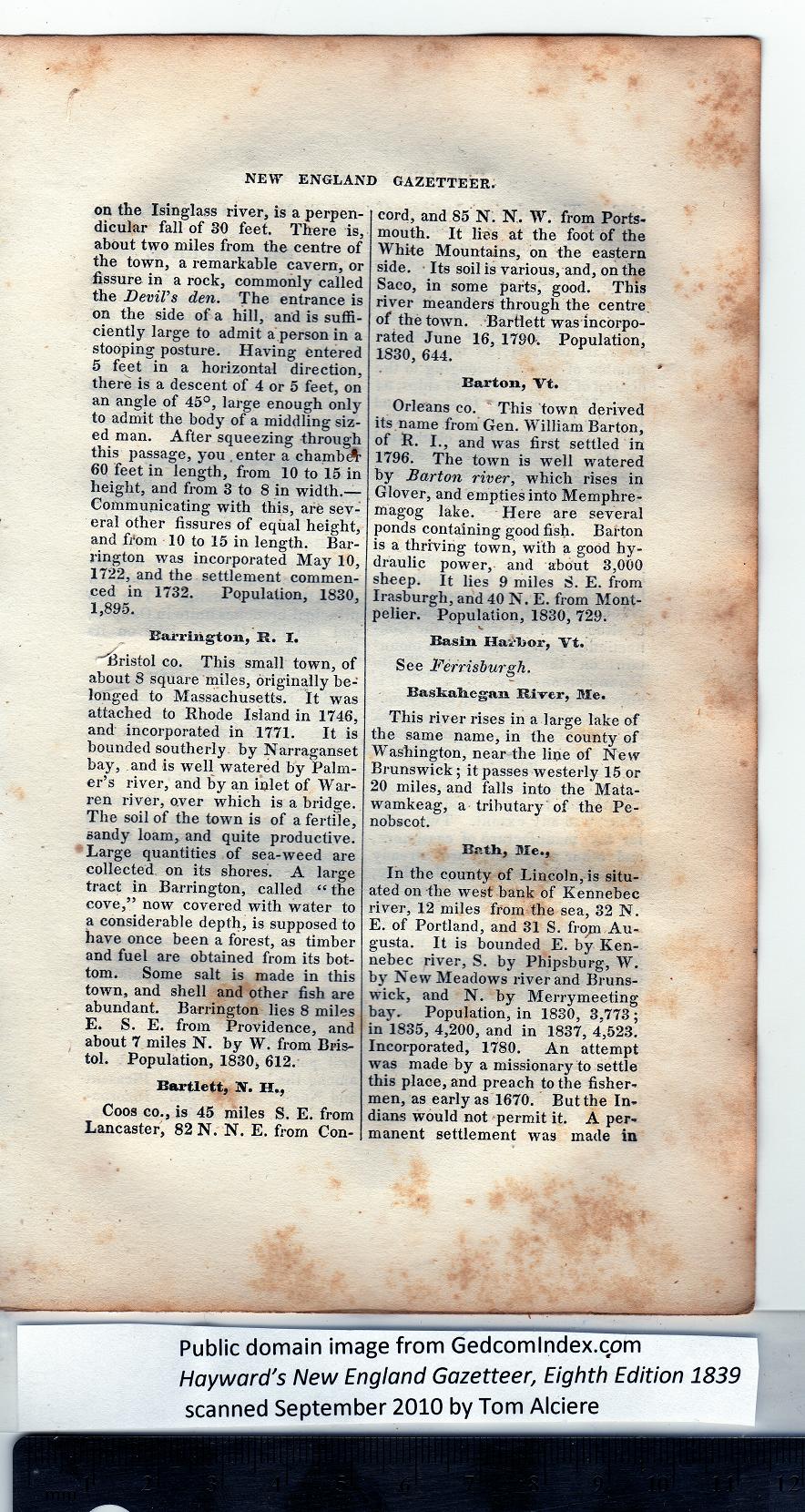|
on the Isinglass river, is a perpen-
dicular fall of 30 feet. There is,
about two miles from the centre of
the town, a remarkable cavern, or
fissure in a rock, commonly called
the Devil’s den. The entrance is
on the side of a hill, and is suffi-
ciently large to admit a person in a
stooping pasture. Having entered
5 feet in a horizontal direction,
there is a descent of 4 or 5 feet, on
an angle of 45°, large enough only
to admit the body of a middling siz-
ed man. After squeezing through
this passage, you , enter a chamb A*
60 feet in length, from 10 to 15 in
height, and from 3 to 8 in width.—
Communicating with this, are sev-
eral other fissures of equal height,
and from 10 to 15 in length. Bar-
rington was incorporated May 10,
1722, and the settlement commen-
ced in 1732. Population, 1830,
1,895.
Barrington, R. I.
"Bristol co. This small town, of
about 8 square miles, originally be-
longed to Massachusetts. It was
attached to Rhode Island in 1746,
and incorporated in 1771. It is
bounded southerly by Narraganset
bay, and is well watered by Palm-
er’s river, and by an inlet of War-
ren river, over which is a bridge.
The soil of the town is of a fertile,
sandy loam, and quite productive.
Large quantities of sea-weed are
collected on its shores. A large
tract in Barrington, called “ the
cove,” now covered with water to
a considerable depth, is supposed to
have once been a forest, as timber
and fuel are obtained from its bot-
tom. Some salt is made in this
town, and shell and other fish are
abundant. Barrington lies 8 miles
E. S. E. from Providence, and
about 7 miles N. by W. from Bris-
tol. Population, 1830, 612.
Bartlett, N. II., |
Coos co., is 45 miles S. E. from
Lancaster, 82 N. N. E. from Con-
cord, and 85 N. N. W. from Ports-
mouth. It lies at the foot of the
White Mountains, on the eastern
side. Its soil is various, and, on the
Saco, in some parts, good. This
river meanders through the centre
of the town. Bartlett was incorpo-
rated June 16, 1790. Population,
1S30, 644.
Barton, Vt.
Orleans co. This town derived
its name from Gen. William Barton,
of R. I., and was first settled in
1796. The town is well watered
by Barton river, which rises in
Glover, and empties into Memphre-
magog lake. Here are several
ponds containing good fish. Barton
is a thriving town, with a good hy-
draulic power, and about 3,000
sheep. It lies 9 miles S. E. from
Irasburgh, and 40 N. E. from Mont-
pelier. Population, 1830, 729.
Basin Harbor, Vt.
See Ferrisburgh.
Baskaliegan River, Me.
This river rises in a large lake of
the same name, in the county of
Washington, near the line of New
Brunswick; it passes westerly 15 or
20 miles, and falls into the Mata-
wamkeag, a tributary of the Pe-
nobscot.
Bath, Me.,
In the county of Lincoln, is situ-
ated on the west bank of Kennebec
river, 12 miles from the sea, 32 N.
E. of Portland, and 31 S. from Au-
gusta. It is bounded E. by Ken-
nebec river, S. by PhipsbuFg, W.
by New Meadows river and Bruns-
wick, and N. by Merrymeeting
bay. Population, in 1830, 3,773 ;
in 1835, 4,200, and in 1837, 4,523.
Incorporated, 1780. An attempt
was made by a missionary to settle
this place, and preach to the fisher-
men, as early as 1670. But the In-
dians would not permit it. A per-
manent settlement was made in |
